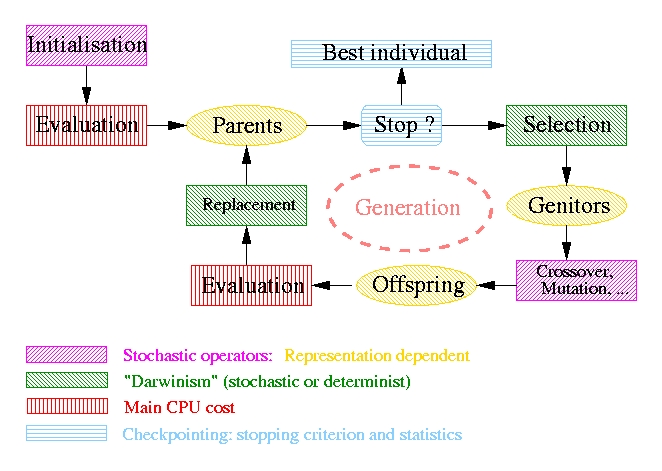
|
#include <iostream> #include <ga/make_ga.h> #include <apply.h> |
|
#include "binary_value.h" |
|
using namespace std; int main(int argc, char* argv[]) { try { |
|
//----------------------------------------------------------------------------- // define your genotype and fitness types typedef eoBit<double> EOT; |
|
eoParser parser(argc, argv); // for user-parameter reading |
|
eoState state; // keeps all things allocated ///// FIRST, problem or representation dependent stuff ////////////////////////////////////////////////////// |
|
// The evaluation fn - encapsulated into an eval counter for output eoEvalFuncPtr<EOT, float> mainEval( binary_value<EOT> ); eoEvalFuncCounter<EOT> eval(mainEval); |
|
// the genotype - through a genotype initializer eoInit<EOT>& init = make_genotype(parser, state, EOT()); |
|
// Build the variation operator (any seq/prop construct) eoGenOp<EOT>& op = make_op(parser, state, init); |
|
//// Now the representation-independent things ////////////////////////////////////////////// // initialize the population - and evaluate // yes, this is representation indepedent once you have an eoInit eoPop<EOT>& pop = make_pop(parser, state, init); |
|
// stopping criteria eoContinue<EOT> & term = make_continue(parser, state, eval); // output eoCheckPoint<EOT> & checkpoint = make_checkpoint(parser, state, eval, term); |
|
// algorithm (need the operator!) eoAlgo<EOT>& ga = make_algo_scalar(parser, state, eval, checkpoint, op); ///// End of construction of the algorith ///////////////////////////////////////// |
|
// to be called AFTER all parameters have been read!!! make_help(parser); //// GO /////// |
|
// evaluate intial population AFTER help and status in case it takes time apply(eval, pop); |
|
// print it out (sort witout modifying) cout << "Initial Population\n"; pop.sortedPrintOn(cout); cout << endl; |
|
run_ea(ga, pop); // run the ga |
|
// print it out (sort witout modifying) cout << "Final Population\n"; pop.sortedPrintOn(cout); cout << endl; |
|
} catch(exception& e) { cout << e.what() << endl; } } |